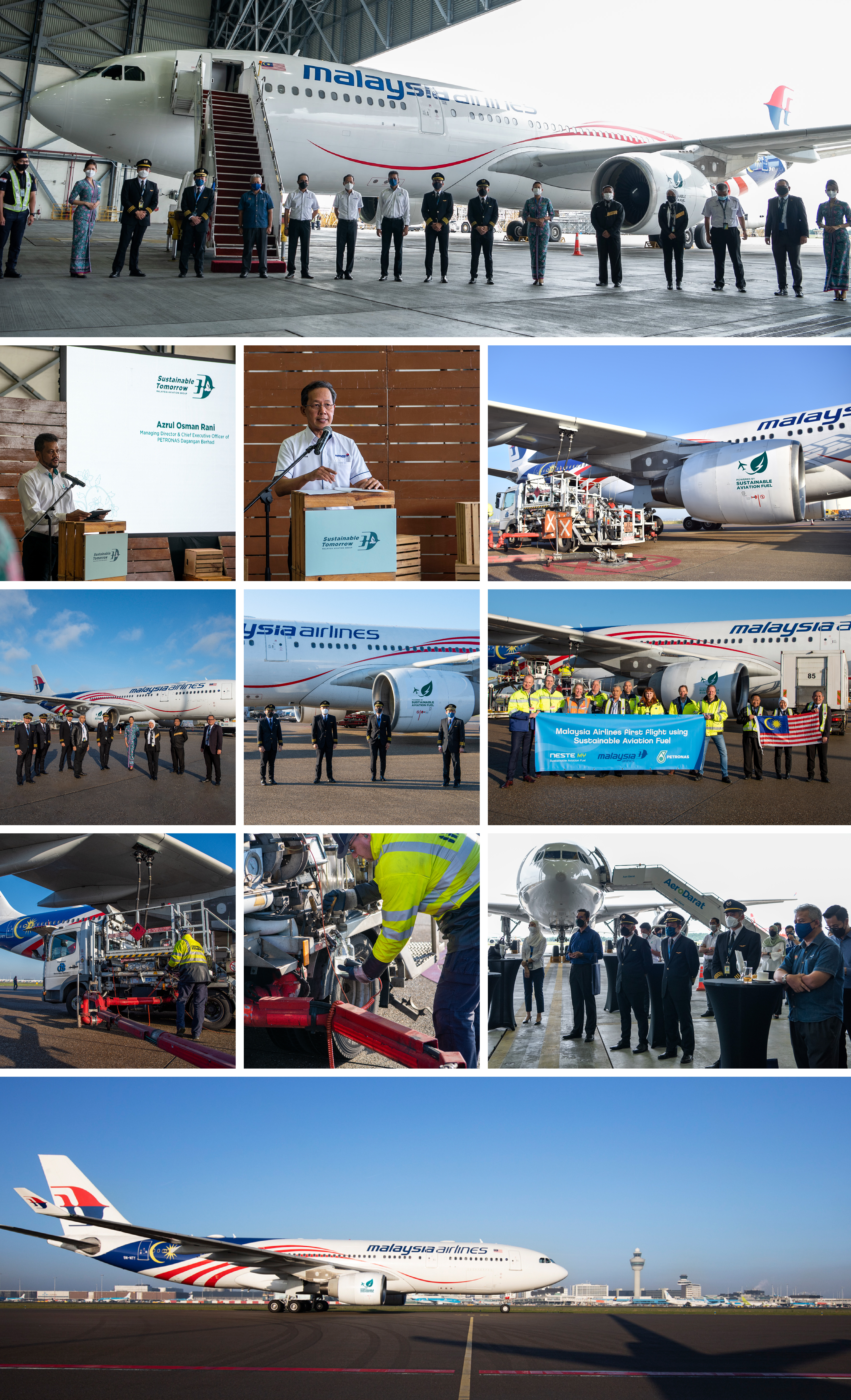Sepang, 17 December 2021 – Malaysia Airlines, the national carrier of Malaysia, today operated its inaugural flight using sustainable aviation fuel (SAF) in partnership with PETRONAS Dagangan Berhad (PDB) and Neste. The flight marks Malaysia Airlines’ commitment to make SAF the cleaner and more viable energy option for regular flights by 2025.
The historic flight MH7979 utilizing the Airbus 330-200 aircraft departed Amsterdam Airport Schiphol at 12:55 pm local time using a blend mixture of approximately 38% SAF made from e.g. used cooking oil, and conventional jet fuel, and arrived in Kuala Lumpur International Airport at 09.00 am local time.
This successful operation was a result of the supply deal between PETCO Trading (UK) Ltd, which is PETRONAS’ marketing and trading arm in Europe, and Neste, the world’s leading producer of renewable diesel and SAF refined from waste and residues.
SAF is recognised globally as the most feasible option to reduce aviation emissions in the near term. Neste MY Sustainable Aviation FuelTM is produced from sustainably-sourced, 100% renewable waste and residue raw materials, such as used cooking oil and animal fat waste. In its neat form, and over the life cycle, Neste MY Sustainable Aviation Fuel reduces greenhouse gas emissions by up to 80%* compared to fossil jet fuel use.
Malaysia Airlines via its parent, Malaysia Aviation Group (MAG), recently partnered with PDB to jointly explore potential collaborative opportunities that advance sustainability, including the supply and adoption of SAF at Kuala Lumpur International Airport (KLIA). They also aim to strengthen awareness in aviation sustainability through a united communication and advocacy strategy around carbon emission reduction.
In addition to using sustainable aviation fuel, preparations for this flight were done with GE Digital’s FlightPulse® and Fuel Insight software that assists the flight crew in planning for efficient fuel procedures during the flight. The data logged during the flight will be processed and analyzed to help the Operations team better understand the opportunities to operate a more sustainable flight.
Izham Ismail, Group Chief Executive Officer of MAG commented: “Building on the momentum from our Net Zero Emissions commitment earlier this year, we are proud to have crossed the significant landmark of operating the first Malaysian flight using sustainable aviation fuel (SAF). Moving forward, we expect SAF to be a key component of our strategy to deliver a more sustainable travel experience for our customers. With the completion of today’s significant first step, we are committed to working towards having a viable SAF supply chain here in Malaysia, and we believe the only way we could reach this goal is through strategic collaboration and support from our stakeholders.”
Azrul Osman Rani, PDB’s Managing Director and Chief Executive Officer said: “Today marks a significant milestone in our partnership of more than two decades with Malaysia Airlines. In line with PETRONAS’ Net Zero Carbon Emissions by 2050 aspiration and our continued efforts to make sustainable energy more accessible, we have been providing cleaner energy solutions including EV chargers, liquefied natural gas (LNG), solar solutions and other renewable energy to support our partners and customers in achieving their emissions reduction ambitions. With SAF now proven to be a feasible alternative for commercial flights, we are excited to continue making headways in this decarbonisation journey.”
Thorsten Lange, Executive Vice President Renewable Aviation at Neste commented: “Neste is committed to helping aviation with its emission reduction targets and we’re delighted to cooperate with Malaysia Airlines and Petronas to complete their first SAF powered flight. Neste’s SAF provides immediate emission reductions and is already available today, playing a pivotal role in decarbonising the aviation industry. We continue to scale up our operations and will have the capacity to produce some 1.5 million tons of SAF annually by the end of 2023.”
In line with efforts towards overall decarbonisation and diversifying its production portfolio, PETRONAS is also venturing into the biofuels space through a planned development of a greenfield biorefinery as well as co-processing at existing PETRONAS facilities. The biorefinery, which is targeted to be ready for start-up (RFSU) in 2025, will be positioned to supply SAF with operational flexibility to also produce hydrogenated vegetable oil (HVO) or renewable diesel.
*Calculated with established life cycle assessment (LCA) methodologies, like CORSIA methodology
